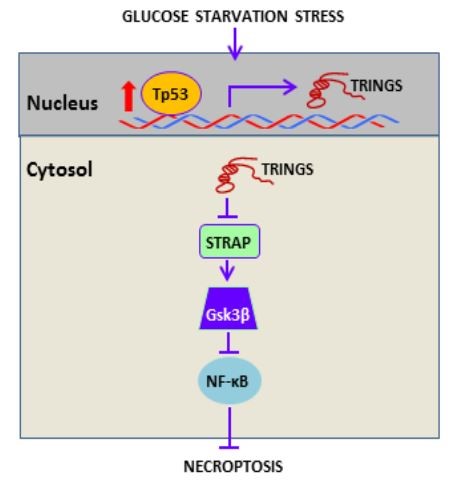Professor WU Mian’s group of the School of Life Sciences in USTC shows that under glucose starvation condition, p53 directly upregulates a novel lncRNA named TRINGS (Tp53‐regulated inhibitor of necrosis under glucose starvation) in human tumor cells. In October 18th, the internationally renowned academic journal The EMBO Journal published the research result which entitled The p53-inducible long noncoding RNA TRINGS protects cancer cells from necrosis under glucose starvation of the research results”.
Tp53 (also known as p53) is a well‐known tumor suppressor gene, and 50% of the tumors harbor mutations in p53 gene. p53 is frequently mutated in many types of cancer, and mutant p53 protein not only exhibits loss of wild‐type (WT) p53 function but also often gains new oncogenic activities favoring cancer development.
However, about half of cancer cells still harbor WT p53 and some tumor cells even show high levels of p53 expression which appears to be in contradiction with the definition of tumor suppressor. Whether WT p53 in the remaining 50% tumor cells is tumor‐preventing or tumor‐provoking is as yet an unanswered question. Approximately half of the tumors still harbor WT p53, and whether and how the WT p53 in cancer cells respond to tumor microenvironments for survival is not well understood. As described by Otto Warburg, the energy in cancer cells is preferentially generated by glycolytic pathways, but the study shows that besides its tumor suppressor function, p53 also helps cancer cells to survive glucose starvation by upregulating a long noncoding RNA TRINGS.

A screen for pathways by which p53 can play protective roles in tumor cell survival identifies the long non‐coding (lnc) RNA TRINGS (Tp53‐regulated inhibitor of necrosis under glucose starvation) as pro‐survival factor in cancer cells under nutrient stress, shedding light on tumorigenic roles of p53.
·The p53‐dependent lncRNA TRINGS is expressed in human cancer cells upon glucose starvation.
·p53 binding to the TRINGS promoter and transcriptional activity are required for TRINGS expression.
·TRINGS depletion causes stress‐induced necrotic cell death and decreased cancer cell growth in vitro and in vivo.
·TRINGS physically interacts with scaffold protein STRAP, leading to its destabilisation through the ubiquitin‐proteasome system.
·TRINGS‐promoted cell survival is mediated via STRAP‐GSK3β‐NF‐κB signalling.
Dr. Muhammad Riaz Khan and graduate student XIANG Shaoxun from the School of Life Sciences are co-first authors of the article. Professor WU Mian from University of Science and Technology of China and Professor SONG Zhiyin from Wuhan University are the corresponding authors. This work was supported by grants from the National Key R&D Program of China, National Natural Science Foundation of China, Hubei Natural Science Foundation, and the Independent Scientific Research Project of Wuhan University.
The study has been published in The EMBO Journal, see more at:http://emboj.embopress.org/content/early/2017/10/18/embj.201696239.long